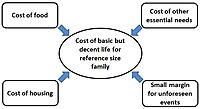
Photo from wikipedia
ABSTRACT The COVID-19 global crisis and the “stay-home” response taken by most governments has starkly exposed the dependence of formal economies on the invisible and unpaid care labor of women… Click to show full abstract
ABSTRACT The COVID-19 global crisis and the “stay-home” response taken by most governments has starkly exposed the dependence of formal economies on the invisible and unpaid care labor of women – a dependence that has intensified during the pandemic as public childcare provision and schools are shut and parents work from home. This article focuses specifically on the childcare and income support provided by grandparents in the United Kingdom and South Africa. In undertaking this comparative analysis the study demonstrates the universality of intergenerational interdependence and the contextual specificity of grandparental childcare and income provision, as well as the differential impacts of suspending, or risking, such supports during the pandemic. Grandparents within and across households make substantial contributions to economic, social, and affective lives, and the study argues for greater recognition of these crucial contributions and the development of a more intersectional understanding of the provision of care work. HIGHLIGHTS COVID-19 has highlighted grandparents’ key contributions to society as part of intergenerational support. In the UK, suspension of grandparents’ informal childcare exposed gaps in formal childcare provision. In South Africa, grandparents maintained caregiving roles in multigenerational households, despite health risks. Grandparents’ contributions must be recognized, reevaluated, and reprioritized in government recovery planning.
Journal Title: Feminist Economics
Year Published: 2021
Link to full text (if available)
Share on Social Media: Sign Up to like & get
recommendations!